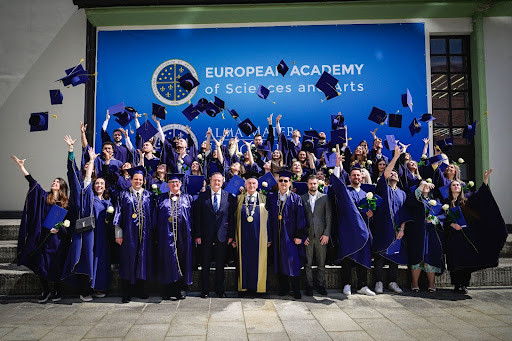Alma Mater Europaea University on the Quiet Migration: American Brainpower Heads to Europe for Doctoral Education

A subtle yet significant shift is taking place in the American higher education system. More students and early-career researchers are looking beyond domestic borders and toward Europe for their doctoral studies, drawn by more streamlined academic structures, affordability, and a desire to escape the turbulence that continues to shape campus climates across the nation. Alma Mater Europaea University, a forward-looking European university, aims to respond to the demands of a modern, globalized knowledge economy.
With campuses in Vienna, Austria, Slovenia, and elsewhere, the university serves students from 30 countries. It offers academic programs in various disciplines, from artificial intelligence and physical therapy to strategic communication and the humanities, among others.
Alma Mater Europaea, initiated by the European Academy of Sciences and Arts, an association of leading scholars, including 37 Nobel Prize winners, represents a new breed of university. It offers pathways that respond to the frustrations and aspirations of a generation increasingly skeptical of the traditional PhD journey.
This trend toward international doctoral migration is part of a broader restructuring of the global higher education landscape. Daily searches by American students for study opportunities abroad skyrocketed from around 2,000 to nearly 11,000 after a change in authority. A corresponding 12% increase in applications from American students to British universities from last year, signifying the highest figure since 2006, further illustrates the momentum behind this movement.
"This uptick reflects concerns over affordability, length, and structure of PhD programs, as well as dissatisfaction with domestic research conditions," says Jurij Toplak, Head of Alma Mater Europaea, Vienna Campus.

Indeed, financial feasibility is a primary catalyst. Alma Mater Europaea University has observed that PhD programs in the US typically span five to seven years, with funding that's usually reliant on competitive teaching and research assistantships. On the contrary, many European doctoral programs are completed within three years and offer tuition-free or low-cost enrollment, particularly in countries like Germany, Austria, and the Netherlands. These programs frequently include salaried research positions or are designed to accommodate professionals who wish to maintain their careers while pursuing advanced study.
"Europe's doctoral model appeals to students because research is emphasized from day one, and redundant coursework is minimized. This means they can focus their energies on their academic passions instead of worrying about financial troubles," Toplak shares.
Interestingly, it was reported that job searches abroad by US scientists surged. Forty-one percent of these inquiries were directed toward Canada, thirty-two percent toward Europe, and twenty percent toward China. Meanwhile, European countries are sensing the opportunity and are proactively courting this talent.
Alma Mater Europaea is not passively benefiting from this shift. It's actively shaping it. The university has developed innovative doctoral offerings that resonate with the motivations of today's mobile scholars. Its newly launched PhD in Applied Artificial Intelligence exemplifies this approach. Tailored for working professionals across disciplines, the three-year, fully accredited program is delivered primarily online, with in-person sessions in both Europe and the US once a year.
Students have the freedom to pursue research that connects to their careers. It can be AI in healthcare, law, finance, or public policy. "This is not a one-size-fits-all doctorate," Toplak emphasizes.
The diversity within the PhD in Applied AI is remarkable. Luca Andriollo, a practicing orthopedic surgeon in Italy, is currently writing his dissertation on AI-assisted robotic surgery. He shares: "Doctoral students here are not computer scientists. Each of us researches AI in our own field of expertise. A lawyer researches legal aspects of AI, a startup owner is developing his AI business solution, and I research AI in medicine. I chose a modern program, offering study on my chosen topic and from any time zone."
Claudio Rossi, another student from Portugal, echoes these sentiments, saying: "I chose the PhD in Applied AI at Alma Mater Europaea because of its interdisciplinary design, flexibility to study while working, and the program's openness to different approaches to AI, including philosophical and ethical perspectives."
These testimonials reflect the university's core philosophy. Alma Mater Europaea is committed to interdisciplinary, globally attuned education, with a curriculum that invites students to explore the technical dimensions of their field and consider broader societal implications. It stands out for its layered, holistic model that mirrors the complexities of the real world, offering a much-needed antidote to the compartmentalization that's usually evident in academic silos.
Ultimately, Alma Mater Europaea provides a compelling alternative to those who are re-evaluating the costs, sacrifices, and returns of advanced education. It offers a streamlined, affordable, and intellectually rigorous doctoral experience that doesn't require individuals to step away from a career but rather integrate seamlessly into it.
Toplak states: "Alma Mater Europaea doesn't treat education as an ivory tower but a tool for global contribution." That ethos resonates at a time when students are not only chasing credentials but pursuing purpose.
© Copyright IBTimes 2025. All rights reserved.





















